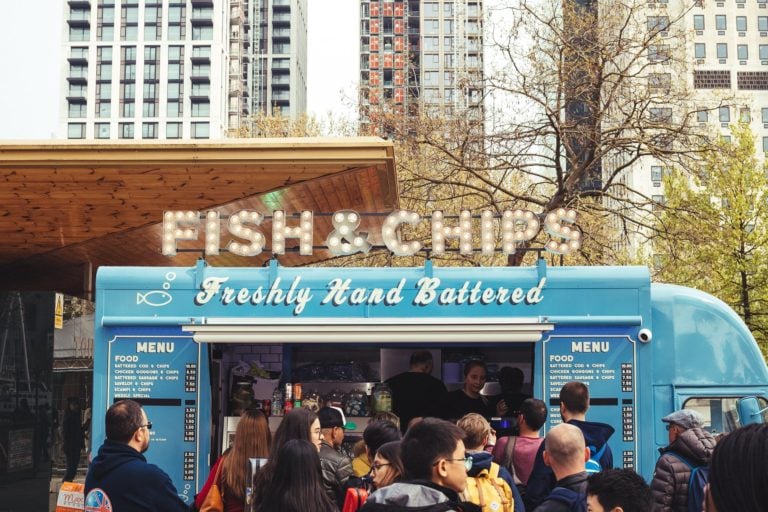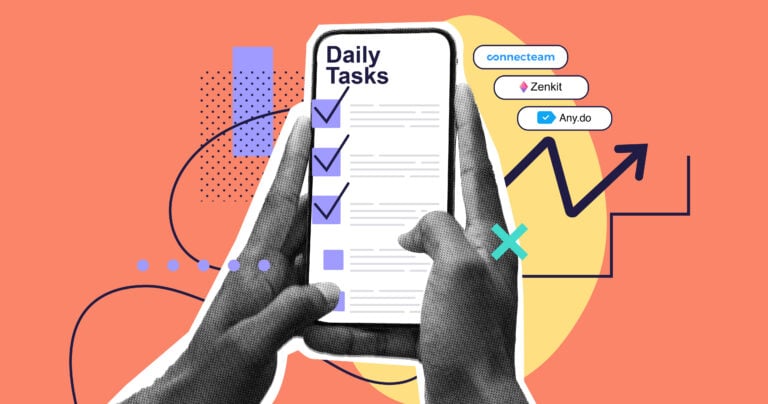The 9 proper steps for how to start a food truck business to make sure you do everything the right way and set yourself up for success.
Starting a food truck business can be one of the most enjoyable experiences for any entrepreneur or aspiring chef.
After all, who wouldn’t want to run their own small business while sharing great food with the people of your community?
Plus, with sit-down restaurants struggling to stay safe amidst a global pandemic, hungry people are flocking to food trucks more than ever before as an alternative to restaurants or fast-food joints.
Of course, if you’ve never done it before, starting a food truck business is a little different from starting any other business. It’s important to understand how to start a food truck business before you start making any plans or get too excited.
That being said, if you do your due diligence and follow the right steps, starting a food truck business can be a rewarding venture. Let’s take a look at the proper steps for how to start a food truck business to make sure you do everything the right way and set yourself up for success.
Write a Business Plan
One way that starting a food truck business is no different from starting any other – you need to work on a detailed business plan.
Even if you already know how to start a food truck business, you need an extensive plan for how you’re going to start and operate your new business. Doing so will force you to ask yourself difficult questions and hammer out the details that you’ll need to know ahead of time.
On top of that, potential investors will want to know as much as possible about your business and have all of their questions answered before deciding to invest in your food truck.
In your business plan:
- You need to map out why your specific food truck is a good idea and why it will serve a forgotten part of the market
- You will also need a rough idea of how much money it’ll cost to get your food truck up and running
- How much money you’ll need from either a loan or investors
- And how long it’ll take to earn back all of the money spent.
In other words, all of your finances need to be in order, including a financial projection of your costs and growth over the next five-plus years.
Set a Budget and Find a Truck
Now that your business plan details how to start a food truck business, you should work on getting your finances in order and a budget in place for your startup costs.
A large percentage of your startup costs will likely be dedicated toward buying the actual truck, which can cost several thousands of dollars.
Remember, no food trucks are the same, so don’t forget to layout in your business plan what type of truck you’ll be needing as costs vary greatly.
Your budget will also help determine whether you buy a truck with a lot of bells and whistles or you look for a used truck that needs some fixing up – expect to pay anywhere between $50,000 – $175,000.
If you can find an old food truck that was used to prepare similar food to the type you plan to sell, that might be your best option. If nothing else, don’t buy the first truck you find because there will be several options available, and you’ll want to do your due diligence in finding the right one.
Get Permits and Insurance for a Food Truck
Unfortunately, one of the boring parts of starting a food truck business is making sure your i’s are dotted and t’s are crossed. While food trucks will have less overhead than a traditional restaurant, there are still permits required to legally operate them – these will change depending on the city and state. Find out from the local DMV or Chamber of Commerce what permits food trucks will need.

Next comes insurance, which is a must-have item for any business, even a food truck. There’s a chance that you’ll be able to save money on insurance because you’ll have less space and fewer employees than a restaurant or other types of business. But you don’t want to start preparing to open a food truck business without first getting the proper insurance and acquiring all of the necessary permits.
Finalize Your Menu
Once all of the boring details are taken care of, you can start to think more seriously about the food you’ll be serving at your food truck.
Ideally, you’ll have a specific type of cuisine in mind before deciding to start a business or even writing a business plan. But at a certain point, you need to make some final decisions about where you’re going to focus your cooking and what items you want to put on your menu.
Remember that you won’t have that much space to cook inside your truck, which is why food trucks have a limited menu compared to traditional restaurants.
- What food do you feel most comfortable preparing?
- What foods will be the easiest to prepare inside of a small space?
- Most importantly, what food can you offer people that they can’t get anywhere else?
Asking yourself these types of questions will help to get the menu right when starting a food truck business.
Purchase Equipment and Supplies
When starting a food truck business, you’ll usually need to solidify your menu before you purchase most of your supplies. After all, how will you know what cooking supplies and equipment you’ll need if you don’t know what foods are on the menu? It’ll be difficult to fit grills, fryers, toasters, and microwaves in a single food truck, so figure out which of those items you’ll actually need.
You’ll also want to be aware of the limited space inside your truck and find cooking equipment that you know will fit.
Of course, there’s a lot more than cooking equipment that goes into starting a food truck business. You will need knives and other kitchen utensils. You will need to stock up on food trays or cups for serving the food, as well as napkins and disposable cutlery for your customers. Finally, you’ll need cleaning supplies for every surface inside your truck so that you keep your truck as sanitary as possible.
Implement An All-In-One Business Management App
As your food truck business grows, you need to look at business management solutions so your day-to-day tasks are easily checked off. Especially when you bring on a larger team as well.
It’s vital that you save time and money on operational tasks, streamlining communication with your team, suppliers, and customers, overseeing business performance, and more.
This is more easily done through the Connecteam business management app! Here’s how:
- Digital checklists and forms make daily tasks easier to manage, while also streamlining recurring processes. Create forms like equipment malfunction reports, truck/kitchen inspection, maintenance work orders, etc.
- GPS time tracking locks in the exact location of your truck(s). Which allows you to collect accurate timesheets and export timesheets to Connecteam’s QuickBooks Online or Gusto integration for 100% accurate and easy payroll.
- Easily book your truck operators or employees with templates, drag and drop, recurring shifts, etc.
- Keep everyone aligned with 1:1 or group chat or a social feed for updates like announcements, employee recognition, equipment updates, etc.
When you have all of these capabilities in one app, it’s much easier to manage your day to day while focusing on the bigger picture.
Best Solution for Running A Successful Food Truck
Try for free, no credit card required
Choose a POS Option
Starting a food truck business may sound simple, but cutting-edge technology will surely play a role. Especially when it comes to managing revenue.
On the surface, accepting only cash payments can simplify things. But it can also limit your customer base because many people prefer to pay with credit cards or other forms of mobile payment these days.
To make sure your food truck doesn’t get left behind, it helps to have a modern POS system. This will allow you to accept cash, credit, and mobile payment.
There are a variety of options when it comes to POS systems, so take your time in selecting one that fits your business. Ultimately, choosing the right one can play a huge role in how smoothly things run inside your truck once things are up and running.
Pick Your Territory
After your menu starts to come together and you have all of your necessary supplies, you need to develop a plan for where you’re going to take your truck. Needless to say, you should have started thinking about this when writing your business plan. But as you get closer to opening your food truck, it’s imperative to have a definite plan. The fact that your food truck is on wheels and can go anywhere you want can make it more difficult to pick what locations to set up shop on certain days.
Naturally, you’ll need to check local ordinances for locations where it’s legal for food trucks to do business and whether or not permits are required.
But you also need to think about places that get a lot of foot traffic and where people are more likely to purchase food from your truck. It sometimes helps to set up shop in the vicinity with other food trucks because that will help attract more people to the area.
But at the same time, be careful about setting up too close to competing food trucks that sell similar food.
Promote and Market Your Food Truck
These days, knowing how to start a food truck business includes understanding how to market your food truck. Of course, a tasty product and word of mouth are still important.
However, food truck owners also need to raise awareness about their business if they expect people to take the time to find them.
Setting up shop at large public events can also help to promote your food truck. But creating a website or social media accounts is essential for modern food trucks. In many ways, it’s a multi-prong effort: you want to win people over with the food but then find a way to connect with them digitally so that they remember that you’re an option and know where to find you the next time they start craving the food that you offer.
Bottom Line On Starting A Food Truck
Are you still dreaming of starting your own food truck business? Well, now that you know the ABC’s you’re almost there!
Remember, it’s a rewarding but time-consuming endeavor. So before you jump in, ensure you have startup capital, the right equipment, a strong business plan, exciting food, and a solid marketing strategy. Having a solid plan in place will differentiate you from the competition and ensure your business doesn’t fail in the first few years.
So, what are you waiting for? Start cooking up your business plan and watch your business grow.
Top Food Truck Business App
Streamline your operation and set yourself up for success!




